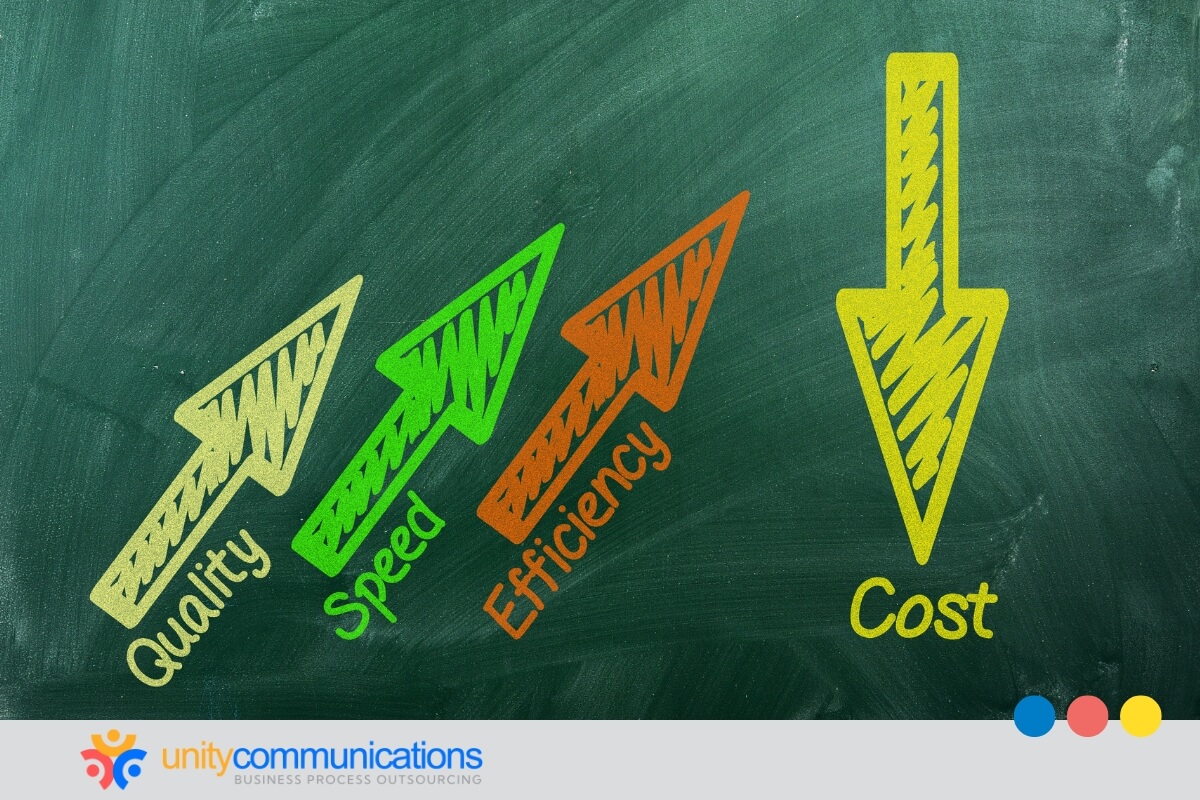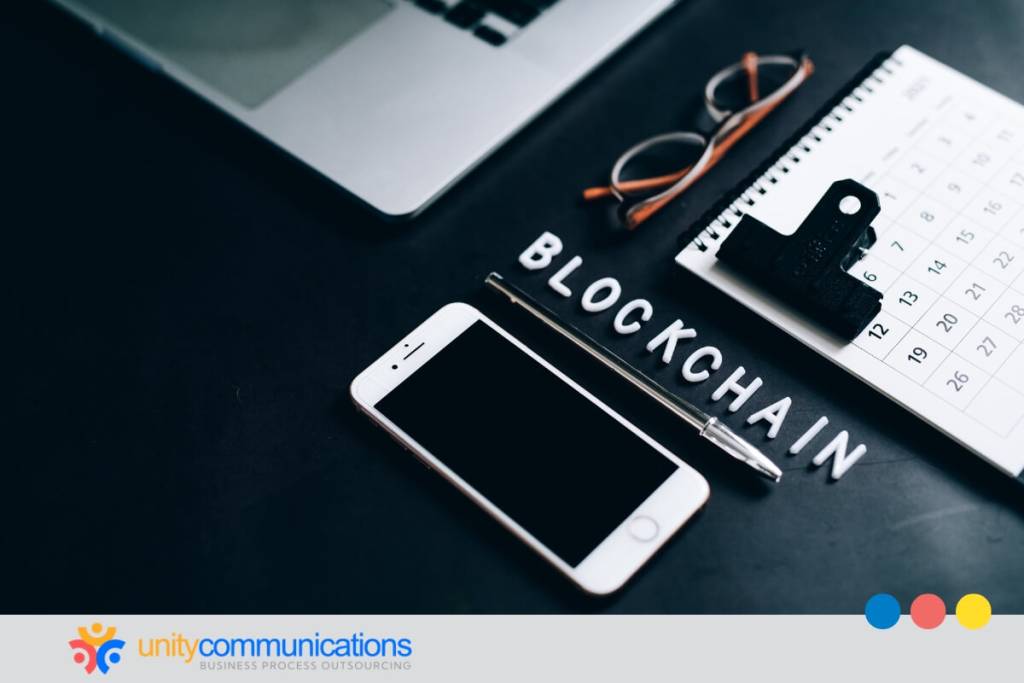IN THIS ARTICLE
Table of Contents
Trust is the foundation of a business relationship. However, maintaining trust in business process outsourcing (BPO) partnerships can be challenging, as operations are spread across different geographic locations and managed by various parties.
Initially developed for cryptocurrency, blockchain technology addresses this issue head-on by ensuring accountability. It provides everyone with complete data visibility, making collaborations more seamless.
This article explores the transformative impact of blockchain applications in BPO operations. Continue reading to discover more!
Overview of blockchain technology in BPO

In recent years, blockchain has become one of the most talked-about technologies. But what exactly is blockchain, and why is it important?
Blockchain is a decentralized digital ledger (DLT) that records transactions across multiple computers for data security and integrity. It operates on a network of nodes, each holding a copy of the ledger. Transactions are grouped into blocks, each connecting to the previous one, forming a chain.
The primary characteristics of blockchain include the following:
- Decentralization. No single entity controls the entire blockchain. This decentralized nature ensures that data is not vulnerable to a single point of failure.
- Transparency. All network participants can view transactions in real time, fostering trust and accountability.
- Immutability. Once data is recorded in a block, it cannot be altered. This immutability is crucial for maintaining data integrity.
- Security. Blockchain records transactions on a tamper-proof ledger, reducing the risk of fraud and building trust through a transparent audit trail.
The global BPO market is set to expand at a compound annual growth rate (CAGR) of 9.6%. This uptrend is due to its capability to enhance efficiency and optimize costs in non-core business functions. Considering its rapid growth and broad coverage, the BPO industry can benefit significantly from blockchain technology.
What is BPO technology, and how can it leverage blockchain to solidify trust?
BPO technology involves the tools, systems, and processes service providers use to streamline outsourced operations. Integrating blockchain applications in BPO tech can significantly improve efficiency and trust through:
- Data recording and validation. Transactions such as customer service interactions or medical payments are recorded on the blockchain. Multiple nodes in the network use consensus mechanisms such as proof of work (PoW) or proof of stake (PoS) to validate the transactions’ authenticity and accuracy.
- Immutable records. Each validated transaction is added to a block and linked to the previous block, creating an immutable record. All stakeholders—clients, service providers, and regulators—have access to a single source of truth.
- Smart contracts. These self-executing contracts have the terms of the agreement directly written into the code. Smart contracts can automate various BPO processes, such as payroll management, service-level agreement (SLA) enforcement, and compliance checks. They reduce the need for manual intervention and minimize errors.
Blockchain’s impact on the BPO industry

The transformative power of blockchain applications in BPO drives innovation, enhances operational efficiency, and redefines industry standards. Here’s how the technology is reshaping the BPO landscape and opening doors to new opportunities for outsourcing firms:
Enhancing data security and transparency
In the BPO industry, handling sensitive client information is a daily task. Blockchain’s encryption capabilities and immutable ledger provide a secure method for storing and transmitting data, significantly reducing the risk of data breaches and fraud.
Blockchain can minimize the risk of data breaches by allowing authorized individuals to access encrypted data on the ledger. Its transparency also means clients can easily track their data’s journey, building trust and confidence in the BPO service provider.
Streamlining processes and reducing costs
Blockchain’s smart contracts streamline various BPO processes. These self-executing contracts with predefined rules minimize manual intervention, leading to fewer errors and faster processing times.
Smart contracts are gaining traction as more BPO companies recognize their potential to automate complex processes. They reduce the need for intermediaries, minimize errors, and ensure timely agreement execution. This shift toward automation allows BPO firms to offer faster and more reliable services, enhancing their competitive edge.
Reducing errors and ensuring accuracy
Data accuracy is crucial in BPO services, and blockchain applications in BPO keep the records correct and tamper-proof. Multiple nodes verify the accuracy of a transaction on a blockchain.
According to a Deloitte survey, 55% of healthcare executives believe blockchain will become critical to their organization within five years. BPO firms that cater to these sectors can leverage the technology to deliver unparalleled accuracy and reliability.
Facilitating cross-border transactions
For BPO companies handling international clients, blockchain simplifies cross-border transactions. Traditional systems are often slow and costly; blockchain provides a faster, cheaper alternative. Real-time transactions come with lower fees, improving the global operation’s efficiency.
Ensuring regulatory compliance
BPO companies rely on regulatory technology (regtech) to follow relevant laws and policies. Blockchain’s transparent and immutable ledger makes it easier to demonstrate compliance with industry standards and regulations.
It simplifies the audit trail so auditors can easily verify transactions and adhere to legal requirements.
Boosting client trust and satisfaction
Blockchain’s transparency and security features significantly enhance client trust and satisfaction. BPO clients can verify the data’s integrity and information security. This trust leads to stronger client relationships and long-term partnerships.
Improving interoperability and collaboration
Blockchain applications in BPO foster greater interoperability between different platforms and systems. This promotes seamless data exchange and communication, improving collaboration and efficiency between BPO providers and their clients.
For instance, decentralized applications (dApps) built on blockchain can integrate with existing enterprise systems to unify workflows. As a result, BPO companies can deliver more cohesive and integrated services to their clients.
Increasing adoption of blockchain for supply chain management
One benefit of outsourced supply chain management is the integration of blockchain applications. BPO companies that manage logistics and supply chains are increasingly adopting the technology to enhance transparency and traceability. This leads to more efficient and secure supply chain operations.
Integrating blockchain-driven innovation in financial services
BPO firms with financial services such as payment processing, fraud detection, and compliance management leverage blockchain to enhance their offerings. Blockchain provides real-time transaction monitoring and secure data storage, transforming how vendors deliver financial services.
As blockchain adoption in finance grows, BPO providers should integrate it into their service portfolios to stay ahead of the curve.
The bottom line

Investing in blockchain technology is necessary to remain competitive in the BPO industry.
What’s in store for outsourcing vendors? Picture a future shaped by cutting-edge automation, seamless connectivity, and remarkable flexibility. These components can address the global market’s constantly evolving and growing demands.
Let’s connect to discover how blockchain and other emerging technologies can revolutionize your business!





